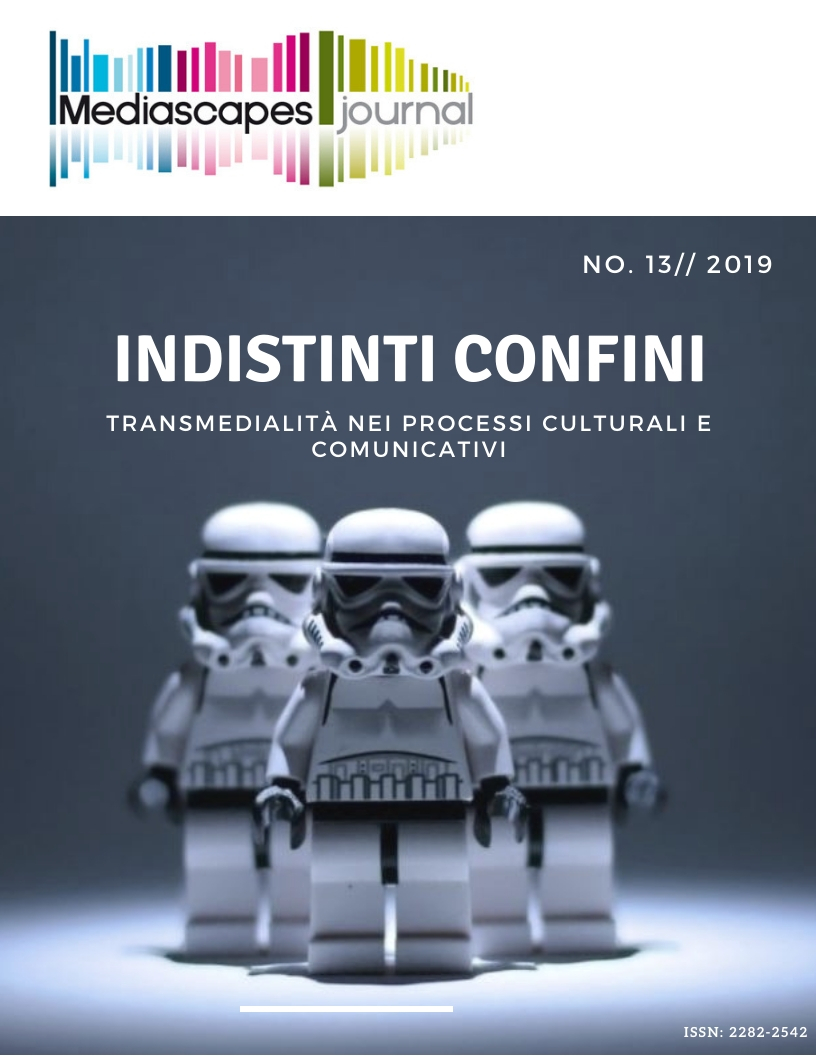La transmedialità tra generi narrativi e dimensione autoriale. Il caso Stephen King
Abstract
By describing the inner mechanisms ruling the Stephen King’s transmedial reign, this paper aims to analyze the transmedia role into the authorial dimension building processes.
The “Stephen King case” helps to highlight a kind of authoriality capable to establish itself into the social imaginary through the vital frame of narrative genres, mainly thanks to “the systematical dispersion on multiple communication channels” (Jenkins) of King’s work.
This description and this analysis begin from the film Carrie (Brian De Palma, 1976) that the author and director adapts from King’s first novel only two years after his literary debut. That is an event which not only immediately connects two authors belonging to different media contexts, but also, significantly, the public character of Stephen King regarding the horror genre dimension, of which he will become a real landmark between the XX and XXI Centuries, an ideal source of remediation (Bolter, Grusin 2003).
King’s career goes on the same path suggested by De Palma’s film, inspiring cult horror movies like The Shining (Stanley Kubrick, 1980) or tv series of the same genre - for example Storm of the Century (Craig R. Baxley, 1999) - and comics - The Dark Tower (King, Lee 2007-2012).
We can add to these aspects the writer’s full awareness of his role into the transmedial fantastic domain, vastly demonstrated in his essays on the topic - Stephen King Goes to the Movies (2009) and Danse Macabre (2016) – in addition to the reflections he developed in the afterwords written in his own novels or on his social media accounts like Twitter. That can be considered the arrival point of a career path which was able to get into the mainstream cultural industry thanks to the genre niche (Abruzzese 2000; Morin 2017) empowering the relationship with the public.
At this point we can also consider the Stephen King’s case as a perfect example of the crucial function which transmedial processes have for the establishment mechanism of authoriality into the fluid context of narrative genres, whose borders end up beyond the pop culture ones.
##submission.downloads##
Pubblicato
Come citare
Fascicolo
Sezione
Licenza
Gli autori che pubblicano su questa rivista accettano le seguenti condizioni:
- Gli autori mantengono i diritti sulla loro opera e cedono alla rivista il diritto di prima pubblicazione dell'opera, contemporaneamente licenziata sotto una Licenza Creative Commons - Attribuzione che permette ad altri di condividere l'opera indicando la paternità intellettuale e la prima pubblicazione su questa rivista.
- Gli autori possono aderire ad altri accordi di licenza non esclusiva per la distribuzione della versione dell'opera pubblicata (es. depositarla in un archivio istituzionale o pubblicarla in una monografia), a patto di indicare che la prima pubblicazione è avvenuta su questa rivista.
- Gli autori possono diffondere la loro opera online (es. in repository istituzionali o nel loro sito web) prima e durante il processo di submission, poiché può portare a scambi produttivi e aumentare le citazioni dell'opera pubblicata (Vedi The Effect of Open Access).


